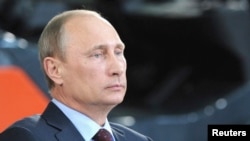Russia and the European Union are beginning two days of talks overshadowed by disputes over the EU's strong backing of the Syrian opposition and Moscow's continued support for President Bashar al-Assad.
Russian President Vladimir Putin hosts a dinner late Monday ahead of a full day of negotiations on Tuesday.
The EU decided last week to lift its arms embargo on the Syrian opposition, clearing the way for member nations to supply weapons to anti-Assad fighters at a later date.
The summit comes as Russia and the United States continue to try to arrange an international peace conference that would bring together both the Syrian government and the opposition pushing to oust Assad.
Russian Deputy Foreign Minister Sergei Ryabkov said Monday that the United States is not putting enough pressure on the Syrian opposition to participate in the international talks and drop its demand for President Assad's exit.
The Syrian government has said it is willing to attend such a conference in principle. But the main opposition coalition has rejected the idea, saying talks are meaningless while Syrian troops backed by Hezbollah and Iranian personnel commit alleged atrocities against the Syrian people.
Russia has opposed any kind of foreign involvement, and has used its veto power on the United Nations Security Council to block three proposed resolutions against the Syrian government.
Also Monday, Israeli Defense Minister Moshe Ya'alon said no Russian shipments of advanced S-300 anti-aircraft missiles to Syria would take place before 2014. He did not elaborate on how he had arrived his conclusions.
Last week, Ya'alon warned that Israel would "know what do to" if Russia fulfilled the delivery of the S-300 system.
Meanwhile, the Britain-based Syrian Observatory for Human Rights said Syrian warplanes pounded the embattled town of Qusair Monday as a government offensive backed by Lebanese Hezbollah fighters entered its third week.
A doctor in Qusair told the Associated Press that 300 seriously wounded residents need to be evacuated for medical treatment. The AP reported that Kasem Alzein pleaded for help, saying previous evacuation efforts failed after a convoy was attacked last week.
Also Monday, four people died in clashes between Sunni and Alawite residents of the northern Lebanese town of Tripoli stoked by the civil war in neighboring Syria.
Lebanon is struggling to curb the spillover of violence from Syria, where 80,000 people have died in the last two years.
Russian President Vladimir Putin hosts a dinner late Monday ahead of a full day of negotiations on Tuesday.
The EU decided last week to lift its arms embargo on the Syrian opposition, clearing the way for member nations to supply weapons to anti-Assad fighters at a later date.
The summit comes as Russia and the United States continue to try to arrange an international peace conference that would bring together both the Syrian government and the opposition pushing to oust Assad.
Russian Deputy Foreign Minister Sergei Ryabkov said Monday that the United States is not putting enough pressure on the Syrian opposition to participate in the international talks and drop its demand for President Assad's exit.
The Syrian government has said it is willing to attend such a conference in principle. But the main opposition coalition has rejected the idea, saying talks are meaningless while Syrian troops backed by Hezbollah and Iranian personnel commit alleged atrocities against the Syrian people.
Russia has opposed any kind of foreign involvement, and has used its veto power on the United Nations Security Council to block three proposed resolutions against the Syrian government.
Also Monday, Israeli Defense Minister Moshe Ya'alon said no Russian shipments of advanced S-300 anti-aircraft missiles to Syria would take place before 2014. He did not elaborate on how he had arrived his conclusions.
Last week, Ya'alon warned that Israel would "know what do to" if Russia fulfilled the delivery of the S-300 system.
Meanwhile, the Britain-based Syrian Observatory for Human Rights said Syrian warplanes pounded the embattled town of Qusair Monday as a government offensive backed by Lebanese Hezbollah fighters entered its third week.
A doctor in Qusair told the Associated Press that 300 seriously wounded residents need to be evacuated for medical treatment. The AP reported that Kasem Alzein pleaded for help, saying previous evacuation efforts failed after a convoy was attacked last week.
Also Monday, four people died in clashes between Sunni and Alawite residents of the northern Lebanese town of Tripoli stoked by the civil war in neighboring Syria.
Lebanon is struggling to curb the spillover of violence from Syria, where 80,000 people have died in the last two years.
Some information for this report was provided by AP, AFP and Reuters.













